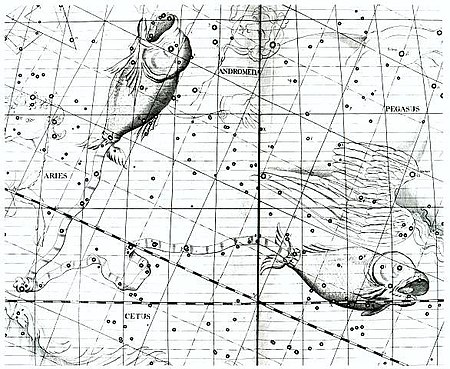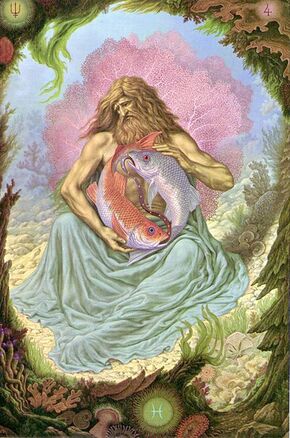Pisces

Symbol: 
Ruling Planet: modern Neptune, traditionally Jupiter
Sun in Pisces: roughly from 20th February until 20th March
Season: just prior to the spring equinox, late winter in the northern hemisphere
Part of the Body: feet
Star constellation: Pisces
Astronomy
There are no prominent stars in the constellation, with the brightest stars being of only fourth magnitude. One star in the constellation, Alpha Piscium, is also known as Alrescha, which comes from the Arabic الرشآء al-rišā’, meaning "the well rope," or "the cord."
Mythology of the constellation
The constellation of Pisces shows two fish with their tails bound together swimming in opposite directions. The Babylonians identified the northern fish with their goddess Inanna - the planet Venus. In Greek mythology, these fish are also associated with Aphrodite (Venus), the goddess of beauty and love. She made her escape from the terrible monster Typhon which the Earth goddess Gaia, in a fit of rage, set loose upon the gods. Aphrodite was hiding in the reeds of the banks of the river Euphrates with her son Eros (Cupid) when two fish swam past and brought them both to safety. According to another version, Aphrodite and Eros transformed themselves into two fish to escape Typhon and are forever bound together.
Liz Greene[2]: In Syrian myth, the larger fish of Pisces was associated with the great fertiliy godess, Derke or Atargatis, portrayed with a women's head upon a huge fish's body.
The Greeks identified this deity with their own Aphrodite, and believed the smaller fish to be her beautiful young lover, Adonis, who was killed by a boar. These two figures, bound together in the heavens, symbolized the great yearly cycle, in which the youthful spirit of newly emerging vegetative life emerged from the fertile womb of nature in the spring and died in the autumn, only to be reborn in the following spring.
This eternal cycle of birth, death and rebirth, expressed through the rhythms of the natural world, also portrayed a profound truth about the nature of human beings. The larger fish became a symbol of the mortal body, with its insatiable appetites and blind instinetual needs. The smaller fish, associated with the goddess' ill-fated lover, became an image of the redemptive power of the immortal spirit which, although trapped in the cycle of mortality, is eternally reborn.
The spiritual symbolism of the smaller fish was also reflected in the semi-divine figure of Orpheus the Fisher, in Greco-Roman myth, around whose tragic life a redeemer-cult was formed. The image of the fish as sacrificial savior or spiritual redeemer found its way into the iconography of early Christianity, where Jesus was himself the Fish and Peter the Fisher of Men.
The mythic imagery of Pisces portrays to us the mystery of an immortal spirit which, although imprisoned in the darkness of the physical world, is forever redeemed and reborn.
The constellation Pisces appears in a part of the sky known anciently as "the sea." This region included Cetus the whale; Andromeda, a beautiful woman chained to a rock in the sea; as well as the half-goat half-fish Capricorn. Winter in the Mediterranean region is the rainy season, suggesting a celestial source for the rains occurring when the sun was in constellations of this region of the sky.
Interpretation
Pisces is the twelfth and last Sign of the Zodiac. To spiritual astrologers, this is where the individual desires to merge with a larger whole that goes beyond the limitations of human existence.
Pisces is a mutable water sign, meaning that Pisces planets are apt to be flexible and adaptable, and to operate primarily through the emotions. Traditionally Venus is exalted in Pisces, in keeping with her mythology. Mercury, in Domicile and exaltation in Virgo, is in its Fall in its opposite sign of Pisces. This does not indicate that people with Mercury in Pisces lack intelligence! It does say something about how their intelligence is likely to be expressed: with an imaginative "big picture" approach, more than an aptitude for analytical fact-finding.
People born with an emphasis of Horoscope factors in Pisces tend to have a powerful imagination and intuition. Spirituality may play an important role in their lives, under Neptunian longing to merge with the divine.
They also tend to have a strong social conscience. They can selflessly help others in need and, because they experience the suffering of others as if it were their own, can sacrifice their own needs to help them. More so than most signs, Pisces can accept people as they are, with all of their imperfections, rather than wanting to change them or avoid them. Pisces individuals have a deep sense of unity of all life and connection of all people. Pisceans also tend to be extremely sensitive to the emotional state of people around them.
There is a danger that such individuals find it difficult to differentiate between where their own boundaries end and those of others start. Because their longing to dissolve these boundaries is so strong, they can tend to ignore their own needs and let other people impose upon them.
Pisces individuals are often dreamers, with a tendency towards escapism of some sort. This might be a pleasant hobby (such as reading science fiction) but if they remain unaware or unhappy they can succumb to addictive behavior, in which drugs or alcohol offer the sense of euphoria and ego-annihilation that spirituality or service to others provide in a healthier way.
In common with the other mutable signs, Pisces individuals have the ability to adapt to their environment. The Virgoan adapts to the conditions given, adjusts his expectations accordingly, and then tries to improve the circumstances. In contrast, the Piscean identifies with them. Pisces shares with the other water signs a developed sensitivity to feelings. Cancer is profoundly aware of the emotional depths, Scorpio is aware of the depths of existence, and Pisces is acutely aware of the interconnectedness of all existence.
Psychological astrology finds a similar mystical desire in Neptune, the modern ruler of Pisces; whereas the traditional ruler Jupiter suggests an approach more in keeping with conventional theology and philosophy.
See also
- Tthe roughly 2,500 year long Piscean Age is in the transformative, in its death phase, ready to transition into the Age of Aquarius
Weblinks
- Wikipedia: Pisces (astrology)
- Pisces the Fish (Deborah Houlding, Skyscript)
- The Zodiac Suite: "Pisces" by Rebecca Tripp (youTube - Video)
- Sound of zodiac - Pisces (youTube)
